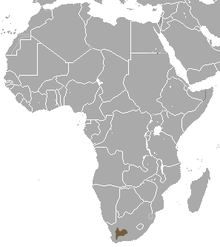Riverine rabbit
| Riverine rabbit[1] | |
|---|---|
| Scientific classification | |
| Kingdom: | Animalia |
| Phylum: | Chordata |
| Class: | Mammalia |
| Order: | Lagomorpha |
| Family: | Leporidae |
| Genus: | Bunolagus Thomas, 1929 |
| Species: | B. monticularis |
| Binomial name | |
| Bunolagus monticularis (Thomas, 1903) | |
 | |
| Riverine rabbit range | |
The riverine rabbit (Bunolagus monticularis), also known as the bushman rabbit or bushman hare, is one of the most endangered mammals in the world, with only around 250 living adults. This rabbit has an extremely limited distribution area, found only in the central and southern regions of the Karoo Desert of South Africa's Cape Province. It is the only member of the genus Bunolagus.
Identification
The Riverine rabbit has the general appearance of most rabbits, but the ears and body are longer. It typically has a black stripe running from the corner of the mouth over the cheek, and a white ring around each eye. It has a brown woolly tail, cream or grayish-colored fur on its belly and throat, and a broad, club-like hind foot. It has a dental formula of 2/1, 0/0, 3/2, 3/3, like other rabbits, with a total of 28 teeth.[3]
Habitat
It is found in only a few places in the Karoo Desert of South Africa's Cape Province, none of them being a protected area. As its name suggest, the Riverine rabbit prefers to occupy river basins and very particular shrubland. The rabbit feeds on the dense shrubland and the soft soil allows for it to create vast burrows and dens for protection, brooding young, and thermoregulation.
Behavior
Riverine rabbits feed on their favourite foods, flowers, grasses, leaves at night, and rest in forms during the day. A form is a shallow scrape made in the soil under a bush. Two types of droppings are produced. While active during the night the rabbit will produce hard droppings, and during the day droppings are soft, taken directly from the anus, and swallowed. In this way the riverine rabbit obtains vitamin B, produced by bacteria in the hind gut, and minerals such as calcium and phosphorus are recycled.
Reproduction
The Riverine rabbit is polygamous, the male mating with more than one female. Like other rabbits, it bears its young underground for protection. The single offspring that the rabbit produces is born altricial, or bald, blind, and helpless, and weighs from 40 to 50 grams. The Riverine rabbit is the only African rabbit that bears its young underground. The helpless offspring stays with the mother until it is capable of living on its own and fending for itself. The low breeding rate of only one offspring per year is unlike most other rabbits and has led to attempts to increase numbers of this endangered species.[4] A breeding colony has been established at the De Wildt Cheetah and Wildlife Centre near Pretoria.[5]
References
- ↑ Hoffman, R.S.; Smith, A.T. (2005). "Order Lagomorpha". In Wilson, D.E.; Reeder, D.M. Mammal Species of the World: A Taxonomic and Geographic Reference (3rd ed.). Johns Hopkins University Press. p. 194. ISBN 978-0-8018-8221-0. OCLC 62265494.
- ↑ Collins; et al. (2003). "Bunolagus monticularis". IUCN Red List of Threatened Species. Version 2006. International Union for Conservation of Nature. Retrieved 2006-05-11. Database entry includes justification for why this species is critically endangered
- ↑ Macdonald, D (2001). The New Encyclopedia of Mammals. Oxford University Press. ISBN 9780198508236.
- ↑ Awaad, Rania (2007). "Animal Diversity Web". Animaldiversityweb.org. University of Michigan. Retrieved 7 December 2014.
- ↑ http://www.botany.uwc.ac.za/envfacts/facts/riverine.htm
External links
- Bunolagus monticularis at animalinfo.org
- World's most endangered mammals at animalinfo.org
- Images and movies of the riverine rabbit (Bunolagus monticularis) at ARKive
- Additional images available at riverinerabbit.co.za
Category:Animals described in 1903 Category:EDGE species Category:Karoo Category:Mammals of South Africa Category:Rabbits and hares
